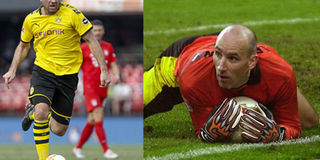Jan Koller: The goalkeeper turned celebrated goal scorer

Both ends. Koller was already an established striker at Borussia Dortmund when circumstance forced him between the sticks (right). He never disappointed. PHOTOS/AGENCIES
By ABDUL-NASSER SSEMUGABI
November 9, 2002. Match day 12 of the 2002–03 Bundesliga season. Borussia Dortmund away to Bayern Munich in Der Klassiker. Czech Republican striker Jan Koller opens the scoring for the visitors in the eighth minute before Roque Santa Cruz and Claudio Pizzaro score in a Bayern retaliation.
Meanwhile, Torsten Frings sees red and in the 67th minute, Dortmund are down to nine men after goalkeeper Jens Lehmann is also sent off. Coach Matthias Sammer, having exhausted his substitutions, sent Koller between the posts.
The gangly striker rolled back his goalkeeping days when he was beginning at Sparta Prague, to make serious saves in the last 20 minutes of the game. Dortmund lost 2-1, but Koller kept a clean sheet.
That performance saw Koller being named by the kicker magazine as the Bundesliga’s top goalkeeper of the week.
You don’t find many top strikers with an almost equal ability to man the posts. This goal-to-goal transition begun when Sparta coach Jürgen Sundermann converted Koller into a striker when he launched his professional career in 1995.
Career moves
After just one season, Koller joined Belgian club Lokeren for €102,000. A return of 43 goals in 97 league games, including 24 in his final season that won him the league’s golden boot, were enough to convince giants Anderlecht, who he joined in 1999.
His partnership with Canadian striker Tomasz Radzinski allowed him to score 42 goals in 65 league games as Anderlecht won back-to-back Jupiler league trophies and subsequent Supercups between 2000 and 2001.
Then Koller signed for Dortmund to begin what became his most career defining spell. In his first season he scored 11 goals as Dortmund lifted the 2001-02 Bundesliga title.
Meanwhile, his influence on the Czech national team was equally growing since his debut in February 1999.
His six goals partly propelled Czech Republic to the Euro 2000 Championship, though the team did not go beyond the group stage. They were no better at the 2002 World Cup.
But two years later, Koller and company played what remains the nation’s best tournament, ever—Euro 2004 in Portugal.
Koller’s striking partnership with Liverpool’s Milan Baroš reminded us of his duo with Radzinski, who had himself let Anderlecht for Everton.
The Czechs led Group D, having won all their matches including the 2-1 victory that knocked out Germany in the last group match.
Baros finished top scorer with five goals while Koller, and another Czech striker Marek Heinz, and France’s Thierry Henry scored two apiece.
However, the Czech lost the semifinals to eventual surprise champions Greece due to a Traianos Dellas’ silver goal, in the additional seconds of the first period of extra time.
The following summer Koller became Czech Republic’s all-time scorer with 39 goals, after putting four past Macedonia in a spell of just 11 minutes of a 6–1 demolition during a World Cup qualifier.
The 2006 World Cup kicked off well, Koller netting the opener as the Czech Republic beat United States 3-0 in their first game. But the giant suffered a thigh injury which ended his campaign as teammates dropped out after losing the other two group matches.
After the World Cup Koller joined Monaco, reminding the Principality faithful of Dado Prso, another towering striker from Eastern Europe, who had joined Rangers two years prior. But unlike Prso, Koller, into his early thirties, was in the evening of his career, with obvious signs of decline. And there would be no return to the peak.
In 54 games in all competitions, over one and a half seasons, Koller managed only 12 goals for Monaco. He returned to Germany, joining Nuremberg—and fellow Czechs Tomáš Galásek and Jaromír Blazek—in the middle of the 2007-2008 season.
However, Koller’s two goals in 14 league games could not save Nuremberg from relegation.
Legacy
In 2007, Germany avenged their Euro 2004 defeat by beating the Czechs 2-1 in front of their home crowds in Prague, German-Brazilian Kevin Kurányi scoring a brace. But some of the key highlights of this Euro 2008 qualifier were the David-Goliath duels between Germany’s right-back Philipp Lahm and Koller.
Standing at 5 ft 7 and weighing about 60kg, Lahm won commendations for the intelligence and heart that contained an opponent standing at 6 ft 8, and weighing0 over 90kg. Koller did not score.
At Euro 2008, after defeating cohosts Switzerland 1-0 in Group A and losing 2-0 to Portugal, the Czechs needed to beat Turkey to advance.
Koller headed them into the lead in 34 minutes, Jaroslav Plasil doubling the lead in the 62nd , but Karel Brückner’s men surrendered the lead, conceding three goals in the last 15 minutes.
That 3–2 ended their campaign and prompted Koller into retirement from the national team.
He would return in July 2009 to boost the nation’s campaign to qualify for the 2010 World Cup but would retire again two months later.
With 55 goals, Koller is Czech’s all-time scorer.
Towards the end of his club football career Koller played in Russia before returning to France, for Cannes in Championnat National, the French third division. In his final season, he scored 16 goals in 29 league games but in August 2011, rocked by recurring injuries, Koller retired.
He had scored over 300 goals and an enviable 64 assists in 678 games for club and country to prove that his conversion from goaltender to goal-getter was a career masterstroke not a mistake.




